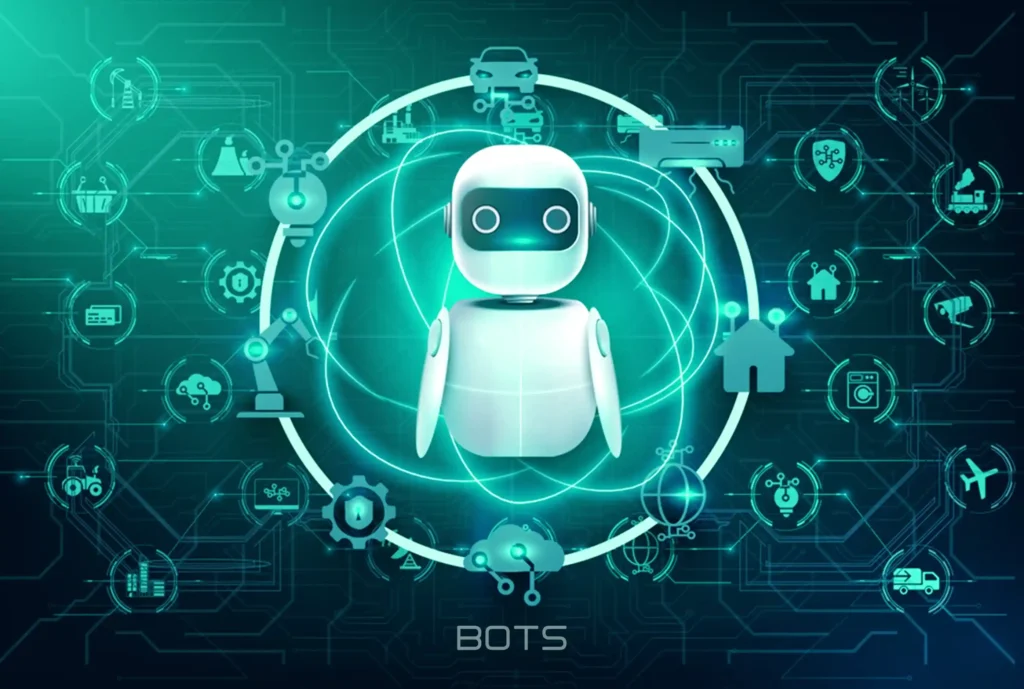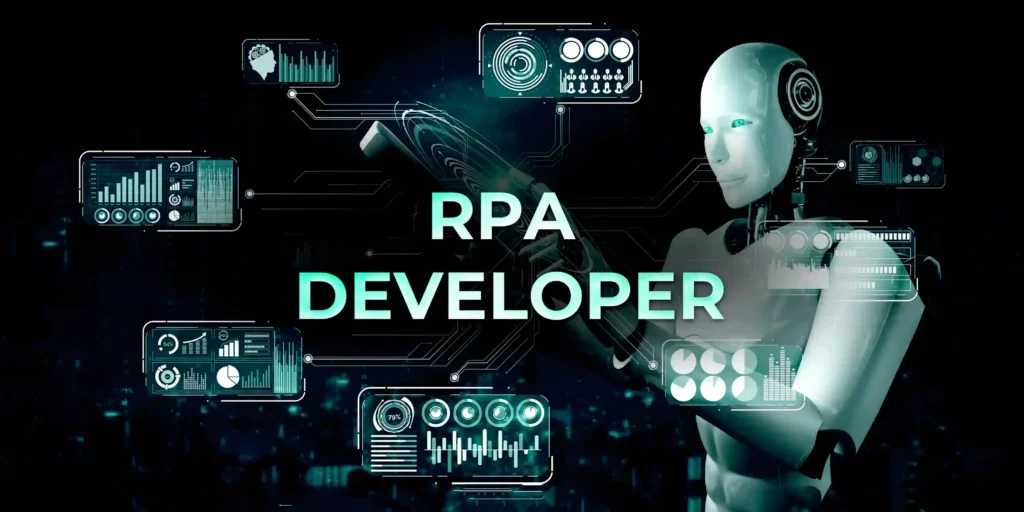Robotic Process Automation (RPA Developer) has come to be one of the most sought-after technologies in recent years. As agencies strive for expanded efficiency and decreased charges, RPA has emerged as a sport-converting solution. In this segment, we can explore what RPA is and why it’s in such excessive demand.
Introduction
Using software program robots, or “bots,” to automate rule-based and repetitive responsibilities in business procedures is called robot system automation (RPA). These bots are programmed to imitate human moves, interacting with various structures and applications like what a human employee would. The intention of RPA is to streamline operations, improve productivity, and prevent errors that may occur due to guide intervention.

The call for RPA developer has grown as corporations recognize the capabilities and benefits of enforcing this automation era. RPA equipment provides an extensive range of skills, permitting companies to automate responsibilities across departments along with finance, HR, customer support, and supply chain control.
The key drivers behind the excessive demand for RPA encompass its ability to enhance operational efficiency via decreasing guide attempts and human error. RPA allows corporations to obtain financial savings by reallocating assets from repetitive responsibilities to more strategic tasks. The scalability and versatility presented by RPA equipment make them an attractive choice for companies seeking to adapt quickly to an ever-changing marketplace panorama.
The Key Skills Required to Become an RPA Developer
Becoming an RPA developer calls for a selected set of competencies and talents. These competencies are crucial for designing and implementing computerized solutions that streamline enterprise approaches.
One of the important competencies required to become an RPA developer is proficiency in programming languages typically used in RPA improvement, together with Python, Java, or C#. These languages allow developers to create and control software robots that automate repetitive duties.
Problem-fixing abilities are essential for an RPA developer. They want you to be able to examine complicated commercial enterprise procedures, become aware of areas for automation, and layout efficient solutions that meet the employer’s goals.
Analytical abilities are also valued in this field. An RPA developer need to have a keen eye for detail and be capable of examining massive amounts of information to become aware of styles and possibilities for automation. This entails expertise in understanding how different systems interact with each other and identifying capability bottlenecks or inefficiencies.
Becoming a successful RPA developer requires a mixture of technical understanding in programming languages for RPA, strong hassle-solving competencies, and analytical capabilities. By honing these key abilities, people can excel in the subject of robot manner automation and make significant contributions to optimizing enterprise strategies through automation.
Essential Tools and Technologies for RPA Development
RPA (Robotic Process Automation) has revolutionized the way businesses automate repetitive duties and streamline their operations. To effectively develop RPA answers, it’s vital to have the right gear and technology at your disposal.
One of the most famous RPA tools available on the market is UiPath. It provides a comprehensive platform that allows developers to design, install, and manage automation workflows. UiPath provides a user-pleasant interface with drag-and-drop functionality, making it reachable even for non-technical customers.
Another extensively used RPA tool by the RPA developer is Blue Prism. Known for its scalability and safety features, Blue Prism lets developers create wise automation solutions that can integrate seamlessly with current systems. It offers a visible designer interface that simplifies the development process.
Automation Anywhere is another distinguished participant in the RPA area. Their platform offers a variety of functions, together with bot improvement, undertaking scheduling, and analytics. Automation Any where’s person-friendly interface makes it smooth for builders to build complex automation workflows.
These RPA tools provide developers with the important capabilities to create efficient and reliable automation solutions. It is crucial to observe that deciding on the proper device depends on precise business requirements and options. Evaluating factors like ease of use, scalability, security, and integration competencies will help determine which tool or platform suits your enterprise best.
Step-by-Step Guide to Kickstart Your Career as an RPA Developer
If you’re inquisitive about pursuing a profession as an RPA developer, there are several steps you may take to kickstart your adventure. It’s vital to understand the role and responsibilities of an RPA developer. RPA developers are liable for designing, developing, and enforcing automation solutions for the usage of RPA equipment and technologies. They work closely with commercial enterprise analysts and stakeholders to identify strategies that may be computerized and then create the important workflows and scripts to automate those methods.
To start your profession as an RPA developer, a robust educational background is important. Think about going after a degree in the data era, PC technology, or a similar discipline. This will offer you the fundamental information about programming languages, algorithms, and data systems that are important for success in this field.
Obtaining relevant certifications can greatly expand your possibilities as an RPA developer. Certifications, which include UiPath Certified Professional Developer or Automation Anywhere Certified Advanced Developer, exhibit your skill ability in specific RPA platforms and technologies.
Once you have received the important training and certifications, gaining practical experience is crucial. Look for internships or access-stage positions that allow you to work with experienced specialists within the area of RPA development. This hands-on revel will no longer only reinforce your capabilities but additionally provide precious insights into real-world implementation eventualities.
Continually gaining knowledge is likewise key in this unexpectedly evolving subject. Stay updated with modern-day improvements in RPA technologies by attending workshops, webinars, or industry meetings. Engage with online groups or boards committed to RPA improvement, wherein you can study from experts and share percentage know-how with fellow professionals.
By following those steps—obtaining a strong academic basis, acquiring relevant certifications, gaining sensible experience, and staying updated with industry trends—you may be well on your way to kickstarting a successful career as an RPA developer.
The Role of an RPA Developer in Business Process Automation
Automation has emerged as a key strategy for enhancing efficiency and streamlining processes in contemporary, rapid-paced commercial enterprise environments. Robotic Process Automation (RPA) plays a crucial role in this endeavor by means of automating repetitive and rule-based tasks that were traditionally finished by human beings.
An RPA developer is a skilled professional who focuses on designing, developing, and enforcing automation techniques and the usage of RPA technology. They are liable for identifying opportunities for automation within a company, analyzing current procedures, and designing automatic workflows to optimize performance.
By leveraging RPA tools and technology, an RPA developer can drastically reduce human blunders, get rid of guide records access obligations, and enhance usual productiveness. This permits employees to focus on extra strategic and value-added sports even as the automatic bots take care of mundane tasks.
An RPA developer performs a crucial role in ensuring the successful implementation of automation initiatives. They collaborate with stakeholders across exceptional departments to recognize their requirements and layout customized solutions that align with specific business wishes.
The role of an RPA developer is important when using commercial enterprise system automation tasks. Their knowledge of automating repetitive duties now not only improves performance but additionally allows businesses to allocate resources more successfully and gain higher degrees of productivity.
Future Trends and Opportunities in the Field of RPA Development
The discipline of robotic method automation (RPA) is experiencing a vast transformation with the upward push of smart automation. As businesses try to streamline their operations and improve performance, RPA has emerged as a powerful device for automating repetitive duties and procedures.
One of the key future trends in RPA improvement is the combination of artificial intelligence (AI) and system-getting-to know technology. By combining RPA with AI abilities, organizations can leverage superior algorithms to examine facts, make predictions, and optimize decision-making tactics. This integration allows RPA structures to grow to be extra clever and adaptive, leading to more suitable productivity and accuracy.
The integration of AI and gadgets gaining knowledge of RPA additionally opens new opportunities for agencies. For instance, predictive analytics can be applied to pick out patterns in facts and anticipate capacity problems or bottlenecks in commercial enterprise approaches. This proactive method allows agencies to take preventive measures before troubles arise, resulting in advanced operational performance.
The mixture of AI and RPA allows for the improvement of clever bots that can take care of complex obligations requiring cognitive competencies. These bots can recognize herbal language, extract data from unstructured records, including emails or files, and even learn from past interactions to continuously improve their overall performance.
The destiny of RPA improvement lies in harnessing the electricity of AI and gadget-studying technologies. The integration of this technology with RPA not only enhances automation skills but also unlocks new possibilities for businesses to optimize their operations and force innovation.
As the demand for robotic procedure automation (RPA) continues to develop, there has never been a better time to embark on the adventure of becoming an in-demand RPA developer. With the speedy development of technology and automation, agencies throughout industries are recognizing the big value that RPA brings in terms of efficiency, cost savings, and improved productivity.
By embracing this exciting journey, aspiring RPA developer can function at the forefront of a swiftly evolving subject. They can work on cutting-edge tasks that streamline procedures and revolutionize how corporations perform. As organizations more and more adopt RPA answers, skilled developers will be in high demand to layout, develop, and deploy automation answers tailored to precise enterprise needs.
FAQ
An RPA developer is charged with developing and retaining software robots (bots) that automate repetitive duties and tactics within an enterprise, enhancing efficiency and lowering human intervention.
An RPA developer often work with programming languages like Python, Java, C#, or scripting languages like PowerShell to create and configure RPA bots.
Key abilities for an RPA developer encompass proficiency in RPA equipment (e.g., UiPath, Blue Prism, Automation Anywhere), trouble-solving abilities, a know-how of commercial enterprise procedures, and the ability to examine, design, and put into effect automation solutions.
Conclusion: Begin the Exciting Journey of Becoming an In-Demand RPA Developer
Becoming an in-demand RPA developer requires a mixture of technical competencies inclusive of programming languages (Python, Java), technique mapping equipment (UiPath, Automation Anywhere), and trouble-fixing competencies. Additionally, having a stable understanding of commercial enterprise procedures and being able to correctly communicate with stakeholders is vital for fulfilment of this position.
Understanding the journey of becoming an in-demand RPA developer opens a world of opportunities. It permits individuals to contribute to virtual transformation efforts even as they take part in a worthwhile profession filled with innovation and professional growth. So, take the leap into this interesting discipline and pave your way in the direction of success as an RPA developer.
READ MORE!!!!!
